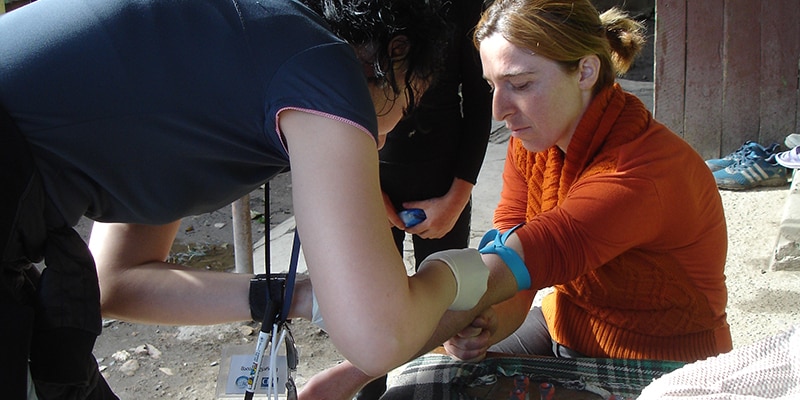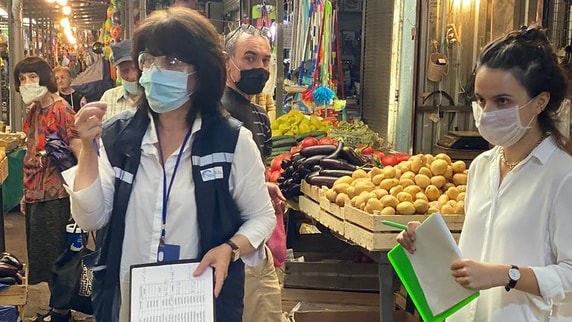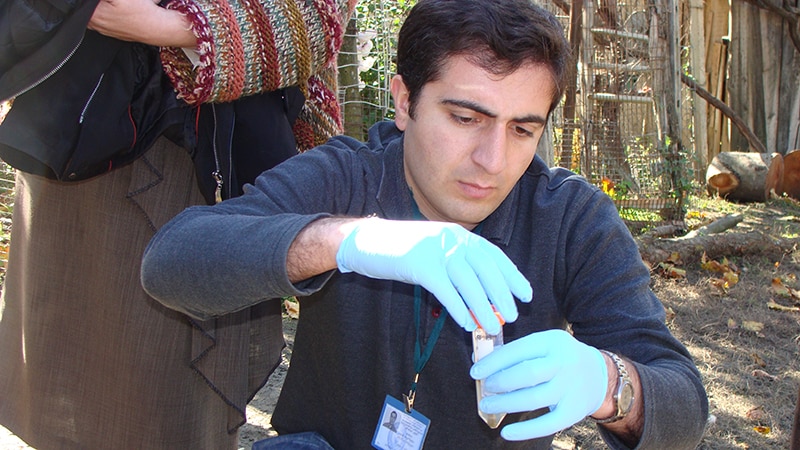CDC in Georgia

A South Caucasus Field Epidemiology and Laboratory Training Program (FELTP) graduate conducts interviews and collects blood samples during a 2014 seroprevalence survey for Crimean Congo Hemorrhagic Fever.
The Centers for Disease Control and Prevention (CDC) first engaged with the country of Georgia in 1995 to assist with the investigation of a large-scale diphtheria outbreak. In partnership with Georgia’s National Center for Disease Control and Public Health (NCDC) and government ministries, CDC strengthens capacity to prevent, detect, and respond to disease threats. This is achieved through CDC’s ongoing work to enhance laboratory, surveillance, and workforce capabilities for COVID-19 response, hepatitis C virus (HCV) and hepatitis B virus (HBV) elimination, measles, and rabies.
CDC Impact in Georgia
Global Health Security
Georgia’s focus on health security began in 2014 when the country volunteered to pilot an early version of the Global Health Security Agenda (GHSA) review that later became the Joint External Evaluation (JEE) tool. In 2021, CDC joined Georgia as co-lead of the GHSA Real-Time Surveillance Action Package. CDC and NCDC support GHSA research and projects including:
- Strengthening the national laboratory system
- Enhancing real-time disease surveillance
- Supporting genomic research of the hepatitis C virus
- Assisting in outbreak investigations of zoonotic, foodborne, and respiratory diseases
- Strengthening molecular detection of drug resistance mechanisms
- Strengthening capacity of the Emergency Operations Center (EOC)
Since 2020, CDC has supported the Public Health Emergency Management (PHEM) system in Georgia and trained over 50 responders for PHEM Rapid Response Teams across 5 regions
In 2021, CDC helped establish the regional-level EOC in Kutaisi, West Georgia
Since 2020, more than 20 central and district-level EOC personnel were trained in public health EOC and emergency management fundamentals
COVID-19
The first case of COVID-19 in Georgia was reported on February 26, 2020. Existing collaborations between CDC and Georgia partners were critical to leveraging previous public health investments for the COVID-19 response. The existing molecular diagnostic infrastructure for hepatitis C, expert workforce, and quality assurance programs were pivoted for SARS-CoV-2 testing. In March 2021, CDC supported the extension of SARS-CoV-2 (the virus that causes COVID-19) sequencing capacity to enhance national and global surveillance of SARS-CoV-2 variants. CDC collaborates on key COVID-19 preparedness and response activities including:
- Establishment of Georgia’s EOC
- Establishment of a national External Quality Assurance (EQA) program for SARS-CoV-2 nucleic acid amplification tests (NAAT)
- Assessment of an antigen-detecting rapid diagnostic testing (Ag-RDT) program for COVID-19
- Integration of COVID-19 into existing disease surveillance platforms
- Population-based SARS-CoV-2 seroprevalence survey
- Supporting the national government to implement the national COVID-19 vaccine deployment plan
- Participating in the COVID-19 national intersectoral immunization council

A Field Epidemiology and Laboratory Training Program (FELTP) team conducted a COVID-19 survey at a marketplace in Georgia in 2020.
In 2021, CDC partnered with the NCDC/Lugar Center to support the establishment of the National EQA program for COVID-19 PCR (polymerase chain reaction) diagnostic testing in more than 50 laboratories across Georgia
In 2022, CDC supported the Lugar Center to conduct an assessment of a COVID-19 Ag-RDT testing program
As of March 4, 2022, Georgia shared more than 1,500 SARS-CoV-2 sequences with the Global Initiative on Sharing All Influenza Data (GISAID)
CDC supported development of infection prevention control (IPC) protocols that were adopted by the Ministry of Health, Labor, and Social Affairs for triage at health facilities, disease surveillance of healthcare workers, use of personal protective equipment, and facility-readiness assessment
CDC worked with partners to train nearly 500 public health professionals in IPC protocols, laboratory diagnostics, rapid response, emergency operations, disease surveillance, contact tracing, and water, sanitation, and hygiene (WASH)
Field Epidemiology Training Program (FETP)
CDC supported the NCDC to launch and implement the Advanced Field Epidemiology and Laboratory Training Program (FELTP) in Georgia, Armenia, and Azerbaijan in 2009 and in Ukraine in 2015. This program trains scientists in epidemiology, veterinary epidemiology, and laboratory quality management systems. More than 120 FELTP graduates investigate disease outbreaks and help their countries adopt disease control measures. From 2018-2020, FELTP-Advanced graduates mentored FETP-Frontline trainees in Georgia. In November 2021, CDC supported the launch of a 10-month, regional FETP-Intermediate with 21 residents selected from Ministries of Health and Agriculture in Armenia, Azerbaijan, Georgia, Moldova, and Ukraine.

A South Caucasus FETP resident collects samples during a 2009 outbreak investigation of Hemolytic Uremic Syndrome (a condition that is most often triggered by an E. coli infection and can lead to kidney failure, permanent health problems, and death).
The FELTP Alumni Association was founded in 2019 and is a crucial asset for the public health system
In 2021, CDC helped launch a regional FETP-Intermediate that includes 21 residents from Armenia, Azerbaijan, Georgia, Moldova, and Ukraine
Many FELTP graduates now hold public health leadership positions in their countries
Laboratory Systems Strengthening
CDC partners with Georgia’s NCDC to increase laboratory and workforce capacities in quality management systems, project management, and disease surveillance. In 2017, CDC helped establish the Lugar Center’s EQA program. CDC collaborates with the Lugar Center on proficiency testing and educational webinars on basic microbiology, laboratory testing, and bacteria isolation methods. CDC also supported Georgia to develop and implement a national Laboratory Information Management System (LIMS). The LIMS connects human and animal health with food safety and environmental health to rapidly identify and contain disease outbreaks across the country. Georgia’s laboratories and LIMS are critical assets to the country’s GHSA goals, One Health approach, and outbreak response.
Hepatitis C
In 2015, with CDC support, Georgia launched the world’s first national viral hepatitis elimination program. The program offers free testing and treatment to all citizens and is a global model for hepatitis elimination. Georgia’s hepatitis C virus (HCV) elimination program received CDC’s Honor Award for Excellence in Partnering in 2021. Georgia was also selected to pilot the World Health Organization’s Interim Guidance for Country Validation of Hepatitis Elimination. With CDC support, Georgia developed the 2016-2021 strategic plan for hepatitis elimination that resulted in a 67% reduction in chronic hepatitis C prevalence by 2021. CDC supported development of the updated 2021-2025 strategic plan.
As of February 2022, over 2.3 million adults have been screened for HCV, more than 96,000 people with chronic HCV infections have been identified, and more than 77,000 people have been treated
More than 98% of people tested after completion of chronic HCV treatment are cured
Nationwide serosurveys show that the proportion of the population with chronic HCV infections decreased from 5.4% in 2015 to 1.8% in 2021. Georgia also eliminated mother-to-child transmission of HBV and achieved the European regional HBV control goal
CDC also supported the Blood Safety Program by implementing nationwide nucleic acid testing on all blood donations
18 Georgian laboratories participated in the CDC-supported hepatitis C EQA program that was established in 2017
Vaccine-Preventable Diseases
CDC’s partnership with NCDC in vaccine-preventable diseases (VPD) began when CDC supported Georgia’s response to a diphtheria outbreak in the 1990s. CDC helped Georgia strengthen VPD surveillance and immunization systems, achieve and maintain polio-free status since 2002, achieve rubella elimination in 2020, and work toward measles elimination. In 2021, CDC provided input on a nationwide serosurvey that included hepatitis B virus (HBV). The survey demonstrated elimination of mother-to-child transmission and achievement of the European regional goal for HBV control in Georgia.
Antimicrobial Resistance (AMR)
AMR and healthcare associated infections (HAIs) impact the quality of healthcare worldwide, increase morbidity and mortality, and lengthen hospital stays. A recent assessment of the global burden of AMR estimates that 1.27 million deaths were attributable to bacterial AMR in 2019. In the broader Central Europe, Eastern Europe, and Central Asia region, more than 73,700 deaths were attributable to bacterial AMR in 2019. Since 2015, CDC has supported partners in Georgia to:
- Increase laboratory capacity for the molecular detection of AMR pathogens
- Establish EQA and laboratory standardization, including international accreditation
- Develop national IPC guidelines, establish and assess programs for IPC at healthcare facilities
- Implement and evaluate sentinel surveillance for healthcare-associated infections
- Monitor AMR patterns of enteric and other pathogens
In partnership with the American Society of Microbiology, CDC delivered 10 webinar trainings and developed 7 protocols and standard operating procedures for the Lugar Center and 23 national antimicrobial AMR laboratories in 2021
One Health
CDC works with partners in Georgia to approach disease from a One Health perspective, recognizing that the health of people is connected to the health of animals and the environment. CDC collaborates with Georgia’s Ministry of Environmental Protection and Agriculture (MEPA) and NCDC to increase capacity for laboratory diagnostics, disease surveillance, and outbreak response for control of zoonotic, foodborne, waterborne, and enteric diseases. CDC implements the One Health approach by working with partners to:
- Develop disease control guidelines
- Strengthen avian influenza surveillance
- Enhance sequencing capacity in MEPA
In 2020 and 2021, CDC partnered with the NCDC to establish and conduct trainings on a modified testing algorithm for identification and referral of Campylobacter (a bacteria that causes gastrointestinal illness)
CDC helped establish the Pulse-field Gel Electrophoresis (PFGE) testing method for enteric pathogens (intestinal bacteria) in 2019
CDC continues to help facilitate PFGE for routine disease surveillance and detection of foodborne disease outbreaks
Over 700 animal samples of the Akhmeta virus (a type of orthopoxvirus that can infect animals and humans) were collected and studied to establish the burden of disease and identify risk factors for human and livestock infections
- 5 Locally Employed
- Population: > 3.7 million
- Per capita income: $14,160
- Life expectancy: F 78 / M 70 years
- Infant mortality rate: 8/1,000 live births
Sources: World Bank 2020, Georgia; Population Reference Bureau 2021, Georgia